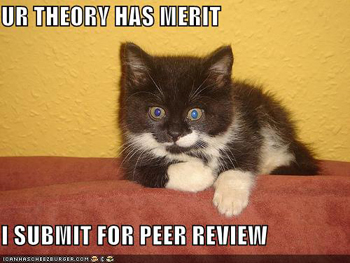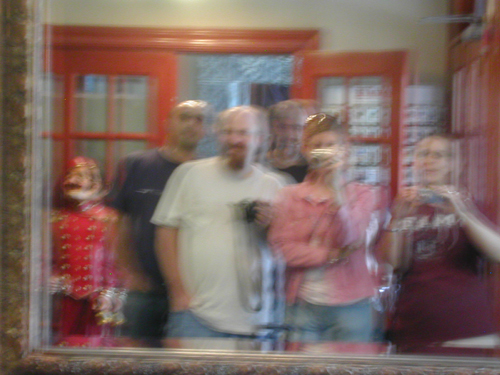I’m blogging from the 2007 Annual Meeting of the American Society for Information Science and Technology in Milwaukee, Wisconsin. This morning, I was part of a session (along with Bora Zivkovic and Jean-Claude Bradley) entitled “Opening Science to All: Implications of Blogs and Wikis for Social and Scholarly Scientific Communication”. I thought I’d make a few brief comments about the session while my impressions are still fresh, but I reserve the right to say more later.
Category Archives: Blogospheric science
Other bloggers offer (better?) incentives for Blogger Challenge donors.
We’re in day 2 of the ScienceBlogs Blogger Challenge, during which we’re working with DonorsChoose to raise some money for classroom projects. The amount contributed by ScienceBlogs readers is creeping up on $4000, which is pretty impressive.
But it looks like the real competition may be for which blogger can offer readers the best incentive to donate.
I thought I was doing pretty well with my offer of poetry, sprog artwork, or a basic concepts post written to order. (Indeed, we’re already on the hook for an illustrated poem.) But my SciBlings have upped the ante:
Does specifying one’s guilty pleasures require an analysis of ‘guilt’ and ‘pleasure’?
Sean, Chad, and Steinn ponder the lameness of academics in self-reporting their “guilty pleasures”.
Quoth Sean:
I immediately felt bad that I couldn’t come up with a more salacious, or at least quirky and eccentric, guilty pleasure. I chose going to Vegas, a very unique and daring pastime that is shared by millions of people every week. I was sure that, once the roundup appeared in print, I would be shown up as the milquetoast I truly am, my pretensions to edgy hipness once again roundly flogged for the enjoyment of others.
But no. As it turns out, compared to my colleagues I’m some sort of cross between Hunter S. Thompson and Caligula. Get a load of some of these guilty pleasures: Sudoku. Riding a bike. And then, without hint of sarcasm: Landscape restoration. Gee, I hope your Mom never finds out about that.
Chad kind of blames technology:
Actually, it’s a little tough to come up with anything that really works, in this age of blogging. After all, a guilty pleasure is something you don’t want other people to know that you enjoy, and a lot of the really good candidates in my life are here for the whole world to see.
Steinn rejects the original question:
I’m not into guilt, and there are real academic pleasures; emotional states that come with the job.
We should revel in them.
As someone with a professional interest in ethics, and — perhaps more importantly — raised by two parochial school graduates, I know a little something about guilt. Let’s see if I can make Sean feel a little less like Caligula.
Facebook needs to hire the ghost of Potter Stewart.
Tara notices that social networking site Facebook has decided, in the enforcement of their policy against “nudity, drug use, or other obscene content”, that pictures of breastfeeding babies are obscene. As such, the Facebook obscenity squad had been removing them — and has deleted the account of at least one mom who had posted such pictures.
Break out the Ouija board and get late Supreme Court Justice Potter Stewart, who famously claimed that he couldn’t define obscenity, but he knew it when he saw it. As far as the legal definition goes, “obscene” seems to be roughly equivalent to “pornographic”. And I’m pretty confident that Justice Stewart, upon seeing a picture of a breastfeeding baby, would recognize that it was not pornographic. (If you are aroused beyond “normal lust” by such pictures, that may just be you, not the pictures themselves.)
So, what’s Facebook’s problem?
Survey on the impact of blogs about science on the world outside the blogosphere.

It has seemed to me for some time now that the landscape of news and information sources has changed since the end of the last century. Anecdotally, I seem to know an awful lot of people who rely primarily on online sources (both online versions of traditional newspapers and magazines and blogs with journalistic leanings that provide solidly researched articles and deep analysis) for their news. But I also seem to know some people who automatically equate information on the internet with the nutty website of a paranoid guy in the cellar.
And it’s really hard to assume that the people I seem to know are a representative sample of the population as a whole.
In the interests of science (what with the penchant for empirical evidence), some folks are trying to get some data on who is reading about science in the blogosphere and about what impact, if any, blogs may be having in the three-dimensional world. To that end, they’ve constructed a survey which you are invited to take. Here’s the official explanation:
This survey attempts to access the opinions of bloggers, blog-readers, and non-blog folk in regards to the impact of blogs on the outside world. The authors of the survey are completing an academic manuscript on the impact of science blogging and this survey will provide invaluable data to answer the following questions:
Who reads or writes blogs?
What are the perceptions of blogging, and what are the views of those who read blogs?
How do academics and others perceive science blogging?
What, if any, influence does science blogging have on science in general?
Please consider participating in the survey as an act of ‘internet solidarity’! It will likely take 10 minutes, and a bit more if you are a blogger yourself. We thank you in advance.
If you survive the survey unscathed, you might even email the link to a friend (although for goodness sake, don’t make a chain letter out of it!) to help build a larger and perhaps more representative sample.
The above LOLcat brought to my attention by RMD, who got to interview Cheezburger!
What are we *really* like? (Thoughts on meeting people you know from online in real life.)
In the aftermath of the ScienceBloggers’ assault on Manhattan, Mark Chu-Carroll put up a nice post on the ways in which bloggers’ real-life manner seemed to match or depart from their online personae.
Maybe philosophy’s to blame, but I think there’s a deep and interesting question here.
Piecing together what happened in New York last weekend.
Actually, my memories of the semi-spontaneous confluence of ScienceBlogs sciblings in the vicinity of the Seed mothership this past weekend are quite vivid, and I’ll put up a proper post on that later today.
But in the event that I hadn’t remembered things so clearly, and had to piece it all together from what came home on my digital camera, my reflections on the last few day might be distorted.

I might end up with something like this:
The ScienceBlogs page on Wikipedia needs your input.
Currently on Wikipedia, there’s a stub that’s trying to become an entry about ScienceBlogs.
And I can’t help noticing that you’re reading a ScienceBlogs blog. (Nice shirt, by the way — it really suits you!)
So possibly you have some idea of what kind of information might be useful to the person turning to Wikipedia to try to understand what this whole ScienceBlogs thing is. If you do, please hie yourself to the discussion from which the entry will be built and discuss.
The other ScienceBloggers will be back soon.
I’ve been getting word (via carrier pigeon, mostly) that some of your favorite ScienceBloggers are just itching to provide you with fabulous new posts. However, a series of massive power outages in San Francisco Tuesday afternoon seem to have given the interwebs some hiccups.
When the series of tubes is properly connected, they’ll be back. Thanks for your patience.
A resolution for the Tripoli six.
Almost a year ago, I learned about the case of the Tripoli six, five Bulgarian nurses and a Palestinian physician in Libya sentenced to death for infecting hundreds of children with HIV despite the fact that the best scientific evidence indicated that the children were infected due to negligence in the hospital well before these health care workers even arrived in Libya.
